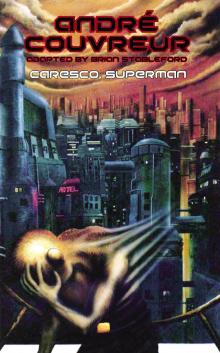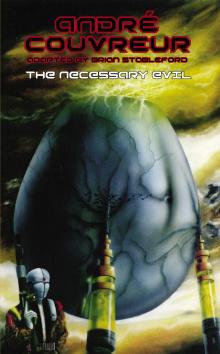- Home
- André Couvreur
The Exploits of Professor Tornada (Vol. 2) Page 9
The Exploits of Professor Tornada (Vol. 2) Read online
Page 9
“The Sleeping Beauty’s castle,” said Marcel. “We’ve been forgotten—so much the better...”
He took me through the drawing rooms and, without giving me time to marvel, guided me with the confidence of a cicerone, consulting a map that he had drawn in advance, through the labyrinth of rooms and corridors leading to the basements. I had to admit that he was remarkably observant. Certain doors that had opened during our first visit in response to a gesture by Monsieur Danator that I hadn’t noticed, opened again when Marcel pressed a button hidden behind a curtain or in a recess in an item of furniture.
We soon reached the sloping gallery with the sinister lighting, and then the armored door, into which our curiosity had run three days before. It was evidently the objective that my companion had in mind, because he stopped in front of that obstacle, consulted his map again, made measurements with a compass, and attempted several contacts without the door opening.
“Let’s go back,” he said, dryly.
We retracted our steps, neglecting the elevator, whose mechanism, in any case, we did not know, and I felt myself breathe deeply when we were up above again. I needed air and space, but Marcel, pitilessly, took me away again, and led me to the mysterious room of power supplies that Monsieur Danator had shown us without letting us into it.
Deliberately, my companion opened it by means of the same procedure.
No! What I saw then…!
There really are scenes that destiny ought to spare virginal souls and those with scrupulous memories.
Certainly, my long sojourns in the Orient, in the wake of my family, had documented me with many things of which the virgins of our society are ignorant, or pretend to be ignorant, but the spectacle that I had before my eyes surpassed all the limits of what can decently be recounted.
If I only had to describe my fiancé lying stark naked, as naked as a worm, to a metallic table, my God, my description would give little enough offence to morality, given that nudity is offered to us in all museums, and that certain exhibitions, accepted by the police, reveal without scandal the triumphant plasticity of women clad only in their skin. Let us add that the beautiful is always chaste and that there are not that many actions that are indecent…but the fact is that my Adam was indulging in disorderly gymnastics! The fact is that standing next to him, clad in a white smock, his father was encouraging him therein; that the negro Ultra, also a spectator, was employing his meager strength to maintain the loins of the young god in a shiny hoop, from which wires emerged. connected to a machine that was evidently purveying a force favorable to that incomprehensible gesticulation.
“What are they doing…?” I said, alarmed.
“Shh!” Marcel ordered.
He was contemplating the scene with an interest in which science alone was in play—and I soon convinced myself that the other two observers, the father and the negro, were similarly commanded by scientific passion. Indeed, after a sequence of demonstrations even more precipitate, Adam executed a bound that nearly threw him off the table; then he slumped back, limply, annihilated by exhaustion.
Then I saw Monsieur Danator hold a glass slide level with the hoop, double it with a second slide, and carry the whole to the platform of a microscope. He consulted the invisible obstinately for some time.
“White cabbage!”19 he groaned, pushing the microscope away with a furious gesture. “Failed again!” Then, to the negro, who was impassive, unable to hear him he went on: “We’ll never get there by this method…in order to produce a vibrion, you see, Ultra, by the excitation of the centers, we need the girl! Nothing but the girl! Come on—let’s change…or rather, no, not yet: we need to de-chalk him...”20
Unhurriedly, his anger suddenly dissipated, and even humming, he set about energetically rubbing a small white patch, similar to chalk, that was incrusted on my fiancé’s buttock. Although, having his back turned to us, Monsieur Danator could not see us, Adam, by contrast, was now looking directly at us, and I was surprised to observe that he was not alarmed by our presence, and that he was even contemplating us with a sort of satisfaction.
“He can see us, Marcel!”
My companion made a reassuring gesture, but my remark had awakened his prudence. He closed the door and took me back to the entrance hall.
“Well,” I said to him then, “what ought I to think about all that? I’m more astounded and more hesitant than ever. I’m definitely going to retract my promise.”
“Why is that Made?”
“Doesn’t what we’ve just seen seem to you to be extraordinary, then?”
“Absolutely not, Made. Adam’s in training for marriage.”
I didn’t know whether he was joking or sincere, but I inferred from that scrap of conversation that, once again, I had opened the way to my heart for him and that, once again, he had refused to take it. I would have heaped my reproaches upon him, but Monsieur Danator arrived at that moment. He had exchanged his smock for a little yellow tussore silk jacket that did not fit him.
With an affable expression, he hastened to say: “Have I kept you waiting? That would be unpardonable if I hadn’t been occupied with my child...”
“How is he?” I asked. “Shall we see him today?”
“No, he’s exhausted by...anyway, he’s exhausted. Don’t ask me anymore. He regrets...” But he suddenly swiveled toward Marcel: “You’ve made your humanities?”21
“It was necessary, for my qualification.”
“Ah! Me too, of course…at any rate, I’ve made a humanity…Greek…pure Greek…but, as I’ve forgotten, could you tell me what age Eros was when he became fully active? You know Eros, the little piggie of Olympus...I’m curious...”
Without waiting for a reply, perhaps carried away by an association of ideas, he turned back to me. “No, of what I regret, you can’t have any idea... He adores you, the darling boy. He’s in bed…he’s incubating…he’s recovering...but how handsome he is! What do you expect? We can do without him for the contract...”
“The contract?”
“Yes? You didn’t know? The notary will be here any minute. Everything’s in order. You have only to sign.”
Oh! No, no more contract. It’s all over, father-in law! My independence, my dignity, at the price of hard labor—too bad! But that’s the way it’s going to be!
I was about to say that out loud when Monsieur Danator declared: “Oh, I forgot, my child…these matters are difficult to regulate…you’re a pauper, aren’t you? You don’t have a red cent?
“Not one—but that’s no longer a consideration, because...”
“It is, indeed, no longer a consideration, since I’m settling six million on you. Is that enough?”
Satanic fellow! He had arguments that could sap your virtue before you could say oof! Six million! A mattress of banknotes, on which I would only have to lie down, once an inevitable divorce was granted. Six million! Enough to guarantee dresses, an automobile, a château and generosity—for I’d be very charitable in forgiving myself for having sold myself. And there would still be enough left over to construct a beautiful laboratory for Marcel, if Marcel—who could tell?—once I was separated from Adam...
I dare not affirm that Marcel envisaged the future in the same terms as me, but he shook his head to beg me to consent. Virtue definitely has a market value. It’s a question of relativity: you can put a price on everything. For a million, I’d have refused, for three I’d have hesitated, but for six…well, for six I shook my head, as Marcel was doing, up and down...up, the high ground I was abandoning; down, the bargain that I was accepting...
“But on one condition,” Monsieur Danator added.
He drew me aside and whispered in my ear: “Which is that you’re intact, my dear, absolutely intact. You’ll understand that I can’t admit that my son’s blood…eh? You understand? Everything’s rosy, then...and the opportunity for me to verify…before…yes, before Adam...that the rose is white, as white as ermine... In consequence, if it isn’t, it would be better
to confess it right away…but it is, I can see it in your eyes...
“So, it’s just a matter of being patient for a fortnight. After that, my God…yes, a year after Adam, well, everything will be as you wish! The coalman in the corner, if that suits you…I’m very modern! I understand these things very well! I spent my youth in the Latin Quarter…and in Montmartre... Olé! Olé! The chicks were ours…but from now until then, you understand me, Chickie, not the slightest little cockerel! Buckled like the chastity-belts in the Musée de Cluny, eh!”
I would have required the innocence of a nun not to understand. Chastity was too easy not to be agreed in advance, but one thing bothered me in that medley of propositions, and that was the investigation that he threw into the balance with his six million. Was I going to submit to that? What expertise…?
But that golden sledgehammer crammed my skull with irrefutable arguments, Monsieur Danator was a physician, after all; one tolerates on the part of men of that profession, in the interests of health, investigations that would be revolting on the part of any other man; was not my mental health, ensured by wealth, worth as much as my physical health, and was the one not a function of the other?
So, I would throw my lily into the Pactolus, and allow my self-esteem to be scratched a little more, which would not be of any importance at all. Hunger justifies the means.
In consequence, when the notary presented himself, I signed the contract with my eyes closed. We had lunch afterwards in the company of the lawyer, but it was an exquisite meal with none of the extravagant preparations that had set me ablaze the time before—a meal such as one eats at a thousand tables. Although still served mechanically, with the sole aid of the negro, it proved that the most succulent foodstuffs could also be cooked in the villa’s mysterious basements.
By dessert, with the aid of burgundy and champagne, I was definitively won over, and, with my elbows on the table, smoking a voluptuously perfumed cigarette, I gazed tenderly at my father-in-law’s cranium and the magnificent surroundings, which were about to become mine.
V
The next day, and the days that followed, were the other side of the coin: no more Danators: not a note; not a sign; not a flower. One might have thought that they had forgotten me, that no contract existed.
The attitude of the people at the hotel increased my disappointment. Merely at the sight of me they adopted the expression of mocking sympathy that distilled venom from my pride. In Frappart and Mademoiselle Laricarière, in particular, that fake sympathy acquired the force of insult. Their long faces said “Thrown over already…poor thing!” and they were covertly exultant.
One evening, after dinner, the tinned-goods merchant dared to come over to me, playing with his monocle. “It’s broken off, then, my dear Mademoiselle?”
“Yes, Monsieur,” I retorted, promising that I would have my revenge the day my fiancé reappeared.
Marcel abandoned me too. Deprived of him, I spent whole days alone, with no appetite for reading, immune to the charms of the view from my window. In the morning, I scarcely bothered to go down to the beach and rarely passed through the Pergola.
Then, forcing myself to take a stroll through the town, I went into the Mairie. A rapid glance at the public announcements, which still included the publication of my banns, eased my anxieties momentarily, and I returned to my claustration.
Those days of abandonment gave me an opportunity to meditate on the subject of my future family. There was plenty to think about. All the peculiar details that I had accepted without blinking at the time they had cropped up ended up, on reflection, with troubling question marks.
To begin with, there was Adam’s mentality. Why those continual absences? Why those abrupt rifts in his trains of thought—immediately compensated, to be sure, by the prodigality of their resumption?
A poet, his father explained; but I could not see myself, in the midst of the exchanges that make up the charm of a household, obliged to shake my husband like a soda siphon in order to reanimate the jet of his weakening brain, or reduced to lighting a cigarette while waiting for him to tear himself away from his verses and readapt himself to the conversation.
And what if these paralyses overtook him at the moment when he was passing from sentimentality to the more positive demonstrations for which he had inspired an anticipatory enthusiasm in me? How would I feel then? I knew the necessity of that perfect accord for conjugal happiness, and how important it was, on both sides, that no breakdown of impulse should occur.
Furthermore, the incessant domination of the father over the son irritated me. I consider the persistence of the authority of creators long after a child is able to venture into life alone to be a benefit for the species; it distinguishes us from the animals—but I could not admit that the guardianship in question should extend beyond the moral domain and persist like the cares of a nurse for her baby. Those cares seemed to me to be taken to a particular extreme in the inconceivable training for marriage that I had involuntarily witnessed.
Convention and prejudice dictate that young women are kept apart from knowledge of generation. In truth, as is inevitable, they think about it a great deal. For one thing, nature imposes the suggestion upon them. They are obliged to remark that formation in different in men and women. They turn away from human anatomy only for the candid indecency of animals to inform them. They therefore perceive very rapidly that the cabbage-patch is not the original domicile of infants, and that if the serpent caused the fall of humankind with the offer of an apple, that apple was not taken in at the level of the Adam’s apple. Thus, there is no ignorance, for anyone; merely equivocation for the most curious.
I had had the privilege of remaining entirely sound in these observations. I had a clear notion of the usage that my husband would make of me, and what I would become in his arms; but until then, so far as I was concerned, the nuptial act had only been a physiological formality assuring me of becoming a mother; my weakness would experience therein the strength of my spouse, and nothing more; our embrace would complete the harmony of our hearts. I was astonished that anyone might lie or kill for love, and that married women might not be content, from that point of view, with the man that had devolved to them.
Now, however, since Adam’s audacities, the functions I anticipated escaped from tranquil submission to natural laws and took on a perverse attraction. That had started at the lunch that followed his shocking bath, and it had been renewed during the return by auto from San Sebastián. When I thought about it, frissons ran through my being; I wanted the emotions to be renewed.
Ought I to attribute those stirrings simply to Adam’s beauty, to the desire that he alone inspired in me? Had other elements, furnished by my inflamed nerves, entered into play? If it were Marcel instead of Adam who had been the dispenser, would I be experiencing the same disturbances? And what if it were the Peruvian woman’s friend, or Frappart, or some other bather on the beach?
For all these reflections, which had been imposed upon me by my baroque situation, Marcel became the scapegoat. He did not have the right to abandon me at that moment. To Adam, and even to others, the sensual mission, but to him, the psychic duty: that was our understanding, our pact; not to fulfill it was a breach of trust.
At the end of the sixth day, weary of the whirlpool of my thoughts, I donned a cape, feverishly pinned a beret, and went out to look for him.
The cool evening air did me good; I walked lightly. The sun was giving the earth its goodnight kiss; there was an unparalleled resplendence, a symphony of radiance, of such profusion that one might have thought that the waters were intoxicated by them, under the gaze of twenty cockleshells with gilded wings returning from fishing.
There was an animated crowd along the sea-front. Sitting on the stone balustrade, young men were chatting noisily with young women. I caught a few of their banal remarks as I passed by.
“Just turn toward the fête,” I wanted to shout at all of them, “and shut up while space speaks! You’re flirtin
g, but behind you, behold the great flirtation of worlds! And you, woman in a raincoat, already lying in ambush, how dare you think of your pasture, when the heavens are pouring the manna of their radiance upon you? And you, grotesque Frappart, and you, venomous Laricarière, what does the sarcasm of your laughter matter, which I’ve just seen by turning round after you passed me by? If you knew, all of you, the man for whom I’m searching...”
I went to his hotel. It was a modest family boarding house in a street at right-angles to the beach. I knocked on his door and, on the authorization to enter, opened it rather urgently to surprise him at his work-table, engaged in an occupation that scarcely answered to his transcendental faculties.
He was making a wig, employing to that effect all the apparatus used by the manufacturers of false hairpieces, including the spherical wooden support on which the false hair is coifed. The particularity in this instance was that he was utilizing very short frizzy hair, as black as a crow. As soon as he saw me he put down his tools, without trying to hide his displeasure.
“Figaro!” I joked.
“Yes…I’m preparing my accoutrement for a ball.” Then, in haste to change the subject: “And you? Your betrothal, your marriage?”
“You’d be better informed. Marcel, if I’d seen you recently.”
“Is that a reproach?”
“Yes, Marcel. I’m no longer anything but a stranger to you!”
“Absolutely not!” he protested. “My affection has not been modified at all. I haven’t lost sight of you…I know everything concerning you. Don’t judge me by appearances. But what do you want…here?”
With a gesture, he indicated his humble lodgings, his books, his work—all the mediocrity that I would have been forced to accept as his wife. But with another gesture, passing through the open window, he took me toward Ciboure, to the riches of the villa. “While over there...”

 Caresco, Superman
Caresco, Superman The Exploits of Professor Tornada (Vol. 2)
The Exploits of Professor Tornada (Vol. 2) The Necessary Evil
The Necessary Evil The Exploits of Professor Tornada (Vol. 3)
The Exploits of Professor Tornada (Vol. 3)